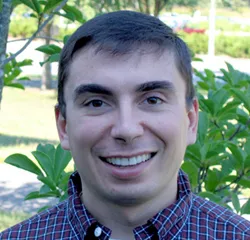Covert Optical Communication
Boulat A. Bash
University of Massachusetts, Amherst
Abstract:
The mere presence of messages compromises privacy of communicating parties even when they employ standard security methods like encryption. We characterize the information-theoretic limits of covert communication, which resists detection by the most powerful adversaries permissible by physics. Surprisingly, while enabling quantum encryption, quantum-mechanical vacuum fluctuation is insufficient for covert communication. However, when the channel introduces noise (e.g., thermal noise from blackbody radiation) above this quantum minimum, standard laser-light transmitter and homodyne receiver enable the reliable transmission of O(\sqrt{n}) bits in n optical channel modes. This is undetected even when adversary intercepts all the photons not reaching the destination, and employs arbitrary quantum memory and measurement resources. Conversely, the square root limit of reliable covert communication is insurmountable. We experimentally corroborate our results on the first proof-of-concept information-theoretically secure covert communication system. Our findings open the possibility of practical realizations of covert communication and sensing, both for point-to-point and networked scenarios.
Biography:
Boulat Bash received his B.A. in Economics from Dartmouth College, Hanover NH, USA in 2001, and his M.S. in Computer Science from the University of Massachusetts, Amherst MA, USA in 2008. He is currently pursuing his Ph.D. in Computer Science from the University of Massachusetts, Amherst. He spent the summer of 2013 as a visiting scientist with the Quantum Information Processing Group at Raytheon BBN Technologies, Cambridge MA, USA. His research interests include privacy, communications, information theory and signal processing.
